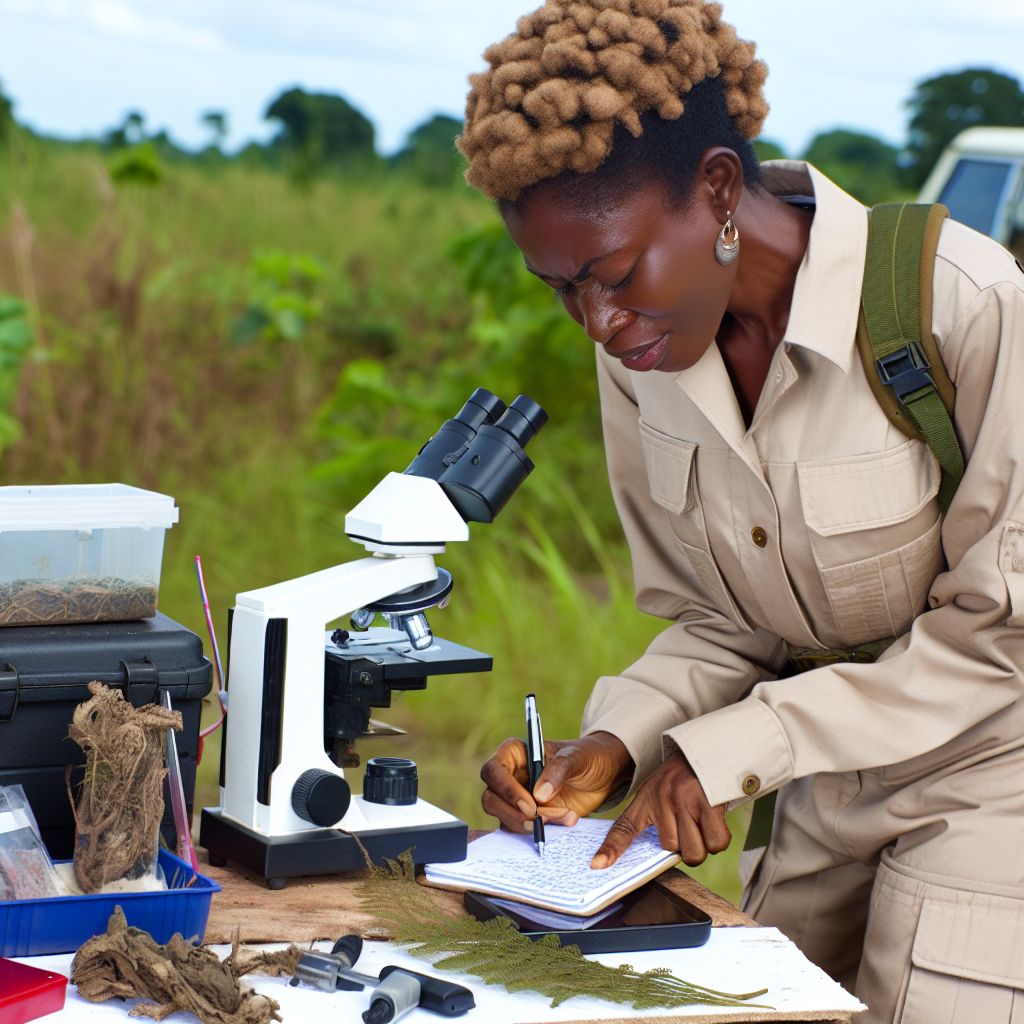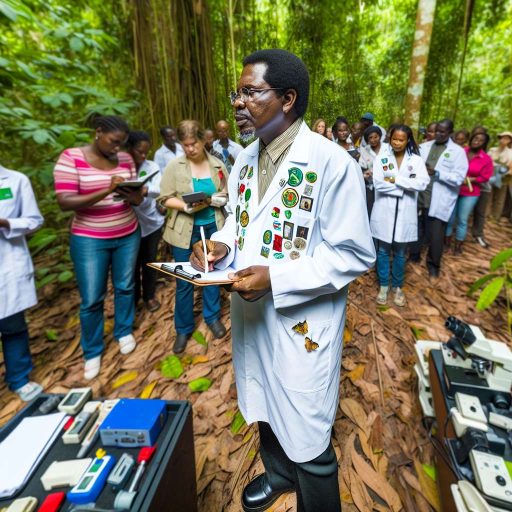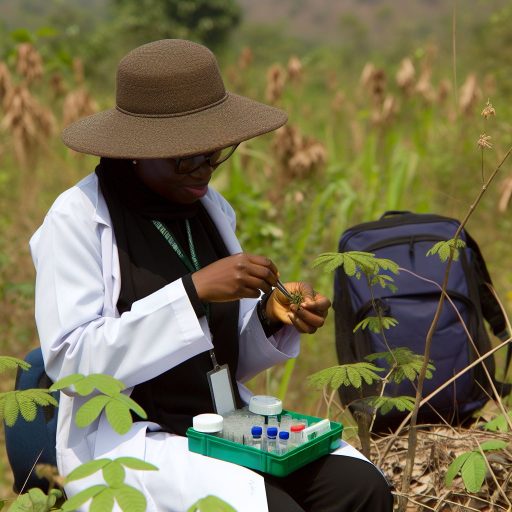Introduction:
Environmental biology in Nigeria plays a crucial role in studying the relationship between living organisms and their surroundings.
Understanding these interactions is vital for sustainable development in Nigeria.
The environment in Nigeria is diverse and fragile, with various ecosystems that support a wide range of flora and fauna.
It is essential to protect and conserve these ecosystems to maintain biodiversity in Nigeria.
Environmental biology helps in identifying the impact of human activities on the environment and finding solutions to mitigate these effects.
By studying environmental biology, researchers and policymakers can develop strategies to promote environmental sustainability in Nigeria.
Overall, environmental biology is a key field that contributes to the conservation and preservation of Nigeria’s natural resources and biodiversity.
History of Environmental Biology in Nigeria:
Environmental biology as a field of study in Nigeria emerged in response to the growing concerns about the impact of human activities on the environment.
It gained momentum in the late 20th century as the country faced environmental challenges resulting from rapid industrialization and urbanization.
Key Milestones and Developments:
- 1970s: The first environmental biology courses were introduced in Nigerian universities, focusing on topics such as ecology, conservation, and pollution control.
- 1980s: The establishment of environmental research institutes and organizations in Nigeria marked a significant milestone in the development of the field.
- 1990s: Nigeria witnessed a surge in environmental activism and awareness, leading to the adoption of policies and regulations to protect the environment.
- 2000s: Collaborations with international organizations and research partnerships helped to enhance the capacity and expertise in environmental biology in Nigeria.
- 2010s: The integration of environmental biology into multidisciplinary research programs and projects further advanced the field in the Nigerian academic and scientific community.
Evolution in environmental biology in Nigeria reflects a growing recognition of the importance of understanding and addressing environmental issues.
This is crucial in the context of sustainable development and conservation efforts.
Current Environmental Challenges in Nigeria:
Deforestation is a major issue in Nigeria.
This is due to logging, agriculture, and urbanization.
Pollution is prevalent, affecting air, water, and soil.
This pollution poses risks to human health and ecosystems.
Climate change impacts Nigeria significantly.
It causes flooding, droughts, and extreme weather events.
Impact of these challenges on biodiversity and ecosystem health:
Deforestation reduces habitats for wildlife.
This leads to loss of biodiversity and disrupts ecosystems.
Pollution contaminates water sources.
It kills fish and aquatic life, harming plant species.
Climate change alters temperature and rainfall patterns.
This affects plant growth, animal behavior, and ecosystem balance.
Find Out More: Nigerian Fisheries and Marine Biology Research
Environmental Biology in Nigeria
Environmental biology plays a crucial role in addressing environmental challenges in Nigeria.
This discipline provides scientific insights and solutions to pressing environmental issues.
Contribution of Environmental Biologists
- Environmental biologists in Nigeria are actively involved in research.
- They study the impact of human activities on the environment.
- These experts work to conserve biodiversity, monitor pollution levels, and develop sustainable practices.
- They advocate for conservation efforts and raise awareness about environmental issues.
- By studying ecosystems, they provide valuable data for informed decision-making.
Research, Policies, and Initiatives
- The Nigerian Conservation Foundation (NCF) focuses on preserving the country’s natural heritage.
- Through research and advocacy, the NCF promotes sustainable development.
- The National Environmental Standards and Regulations Enforcement Agency (NESREA) sets guidelines for environmental management.
- Various universities conduct studies on climate change and pollution control.
- Initiatives like afforestation programs and waste recycling projects are led by environmental biologists.
Environmental biology plays a critical role in addressing environmental challenges through research.
Policy implementation and community engagement are also essential components of this work.
By collaborating with stakeholders, environmental biologists advocate for sustainable practices.
These efforts contribute to a healthier and more sustainable future for Nigeria.
You Might Also Like: Environmental Management Tech Conferences in Nigeria
Conservation Efforts in Nigeria:
Conservation efforts and strategies in Nigeria are crucial to protect the country’s biodiversity and ecosystems.
The government, non-profit organizations, local communities, and individuals are actively involved in various initiatives to safeguard the natural heritage of Nigeria.
Key Conservation Areas, Wildlife Reserves, and National Parks:
- Yankari National Park: Located in Bauchi State, Yankari National Park is one of Nigeria’s most famous wildlife reserves. It is home to a variety of wildlife species, including elephants, lions, and hippos.
- Cross River National Park: This national park is situated in Cross River State and is known for its rich biodiversity. It is a crucial habitat for endangered species such as the Cross River gorilla and the Nigeria-Cameroon chimpanzee.
- Gashaka-Gumti National Park: Located in Taraba State, Gashaka-Gumti National Park is Nigeria’s largest national park. It is renowned for its diverse ecosystems, ranging from montane forests to savannah grasslands, and is home to a wide array of plant and animal species.
- Kainji National Park: Situated in Niger State, Kainji National Park is a significant conservation area in Nigeria. It encompasses the Borgu Game Reserve and the Zugurma Game Reserve, providing habitats for various wildlife species.
These conservation areas, wildlife reserves, and national parks play a vital role in preserving Nigeria’s natural heritage.
They serve as sanctuaries for endangered species, protect important ecosystems, and promote environmental education and ecotourism.
Additionally, Nigeria has implemented several conservation strategies to address threats to biodiversity, such as habitat loss, poaching, and climate change.
Some of the key conservation efforts being undertaken in the country include:
Community-Based Conservation Initiatives:
- Community involvement is crucial for successful conservation efforts in Nigeria. Local communities are being engaged in wildlife protection and sustainable resource management practices.
- By empowering communities to take ownership of conservation projects, there is a greater chance of long-term success in safeguarding Nigeria’s biodiversity and ecosystems.
- Community-based conservation initiatives also seek to enhance the livelihoods of local residents by providing alternative income-generating activities that are compatible with conservation goals.
Legislative Measures and Policy Frameworks:
- The Nigerian government has enacted laws and established policy frameworks to protect biodiversity and regulate natural resource use. These legal instruments aim to ensure sustainable management of the country’s ecosystems.
- Legislation such as the Endangered Species (Control of International Trade and Traffic) Act and the National Parks Service Act provide a legal framework for the conservation and management of wildlife and protected areas in Nigeria.
- These legislative measures are crucial for enforcing regulations against poaching, illegal trafficking of wildlife, and habitat destruction, thereby helping to conserve Nigeria’s natural heritage.
Collaboration with International Conservation Organizations:
- Nigeria actively engages with international conservation organizations and partners to benefit from their expertise, knowledge, and funding support for conservation projects.
- Partnerships with organizations such as the World Wildlife Fund (WWF), the International Union for Conservation of Nature (IUCN), and the United Nations Environment Programme (UNEP) enable Nigeria to access global best practices in conservation.
- Through collaboration with international partners, Nigeria can enhance its conservation efforts, implement sustainable development initiatives, and participate in international conservation agreements and conventions.
Find Out More: Ecotourism Opportunities in Nigeria
Importance of Environmental Education in Nigeria
Environmental education plays a crucial role in raising awareness and promoting sustainable practices in Nigeria.
It helps in increasing awareness about the importance of preserving natural resources and protecting the environment.
Transform Your Career with Expert Guidance
Get personalized mentorship consulting that’s tailored to your unique path. Our expert advice is actionable and exclusive.
Get StartedBy educating individuals about the consequences of their actions on the environment, they become more conscious of their choices.
Through environmental education, individuals are educated on sustainable practices that help in reducing waste, conserving energy, and protecting biodiversity.
This leads to the promotion of eco-friendly habits that contribute to a healthier environment.
Environmental education has the power to influence behavior change among individuals in Nigeria.
By imparting knowledge about environmental issues and solutions, people are more likely to adopt environmentally friendly habits and make informed choices that benefit the environment.
Environmental education plays a significant role in promoting conservation efforts in Nigeria.
It helps in instilling a sense of responsibility towards protecting natural habitats, wildlife species, and ecosystems.
By educating the public about the importance of conservation, efforts can be directed towards preserving the country’s natural heritage.
Environmental education also plays a key role in advocating for policies and regulations that support environmental conservation and sustainability.
Through informed advocacy efforts, individuals can push for policies that prioritize environmental protection and encourage sustainable development practices.
Environmental education empowers communities in Nigeria to take proactive steps towards environmental conservation and sustainable living.
By providing them with the knowledge and skills needed to address environmental challenges, communities can play a more active role in protecting their local environment.
A focus on environmental education contributes to improving the quality of life in Nigeria.
By promoting a clean and healthy environment, individuals can enjoy better health outcomes, access to clean water and air, and a more sustainable and resilient living environment.
The importance of environmental education in Nigeria cannot be overstated.
It is essential for creating awareness, promoting sustainable practices, driving behavior change, supporting conservation efforts, advocating for policies, empowering communities, and enhancing the quality of life.
By prioritizing environmental education, the country can move towards a more sustainable and environmentally conscious future.
Learn More: Environmental Management and Climate Change in Nigeria

Collaboration and Partnerships
Collaborations play a crucial role in promoting environmental biology in Nigeria.
By bringing together government agencies, NGOs, academia, and local communities, these partnerships help in addressing environmental challenges effectively.
Government Agencies
- Government agencies in Nigeria, such as the Federal Ministry of Environment, play a key role in enacting policies and regulations to protect the environment.
- These agencies collaborate with research institutions and local communities to implement sustainable environmental management practices.
- Through partnerships with various stakeholders, government agencies can leverage resources and expertise to address environmental issues at a national level.
Non-Governmental Organizations (NGOs)
- NGOs, such as the Wildlife Conservation Society of Nigeria, work towards environmental conservation through advocacy, research, and community engagement.
- By partnering with government agencies and local communities, NGOs can amplify their impact and reach a broader audience in promoting environmental awareness.
- Successful collaborations between NGOs and other stakeholders have led to the preservation of critical habitats and species in Nigeria.
Academia
- Academic institutions in Nigeria play a vital role in advancing research and education in the field of environmental biology.
- Collaborations between academia and government agencies enable the translation of scientific findings into policy recommendations for environmental conservation.
- Through partnerships with local communities, academia can foster knowledge exchange and capacity building for sustainable environmental practices.
Local Communities
- Local communities are key stakeholders in promoting environmental biology in Nigeria, as they often bear the direct impacts of environmental degradation.
- Partnerships with local communities help in raising awareness about environmental issues and fostering community-led conservation initiatives.
- Successful partnerships with local communities have led to the establishment of community-based conservation projects and sustainable livelihood programs.
Initiatives and Impact
- Several successful partnerships and initiatives have had a positive impact on environmental conservation in Nigeria.
- For example, collaborations between government agencies, NGOs, and local communities have resulted in the protection of endangered species and ecosystems.
- Joint efforts to clean up polluted waterways and promote sustainable agricultural practices have also yielded tangible benefits for the environment.
Collaborations and partnerships between government agencies, NGOs, academia, and local communities are essential for promoting environmental biology in Nigeria.
By working together towards common goals, stakeholders can drive positive change and ensure the sustainable management of Nigeria’s rich biodiversity.
Future Outlook for Environmental Biology in Nigeria:
Environmental biology in Nigeria is poised for significant advancements in the coming years.
The rapid industrialization and population growth in Nigeria present both opportunities and challenges for environmental biology.
Advancements in technology can enhance research capabilities in monitoring and addressing environmental issues in Nigeria.
One potential advancement is the use of remote sensing techniques to track changes in the environment over large areas.
Another area of growth could be in the development of bioinformatics tools for analyzing complex environmental data.
Additionally, the integration of big data and machine learning algorithms can help identify patterns and trends in environmental biology.
Challenges in environmental biology in Nigeria include inadequate funding for research and infrastructure development.
Limited access to advanced laboratory equipment and technologies hinders progress in environmental research and conservation efforts.
Addressing these challenges will require collaborations between government, academia, and industry to invest in research and education.
Recommendations for future research in environmental biology include studying the impact of climate change on biodiversity in Nigeria.
Exploring the potential of bioremediation techniques to clean up polluted sites and restore ecosystems is another crucial area of research.
Education programs should focus on training a new generation of environmental biologists equipped with interdisciplinary skills.
Policy development is essential to establish regulations and guidelines for sustainable resource management and environmental protection.
Public awareness campaigns on the importance of environmental conservation can help foster a culture of environmental responsibility in Nigeria.
Collaborative efforts with international organizations can provide opportunities for knowledge exchange and capacity building in environmental biology.
Overall, the future outlook for environmental biology in Nigeria is promising, with the potential for significant advancements in research, education, and policy development.
Importance of Environmental Biology in Nigeria
Environmental biology in Nigeria plays a crucial role in understanding and protecting the country’s diverse ecosystems.
It involves studying the interactions between living organisms and their environments.
This field addresses pressing environmental issues such as pollution, habitat destruction, and climate change.
It is essential to recognize the significance of environmental biology in ensuring the sustainability and health of Nigeria’s natural resources.
Continued efforts to protect the environment through research, conservation, and education are imperative.
These efforts can help mitigate the negative impacts of human activities on ecosystems.
By prioritizing environmental biology, Nigeria can work towards achieving a more sustainable and resilient future for both its people and its biodiversity.
Additional Resources
Drought, desertification and the Nigerian environment: A review
Nigeria’s water crisis: Abundant water, polluted reality – ScienceDirect




